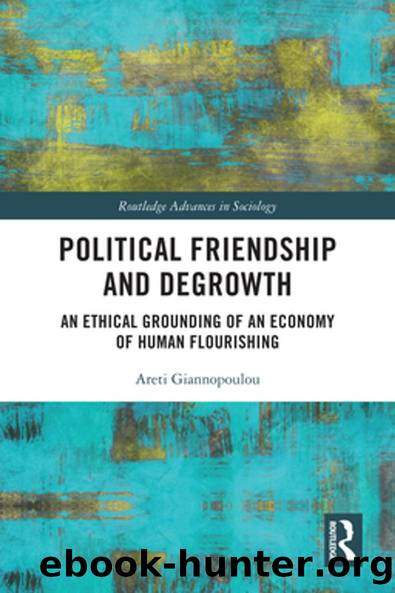Political Friendship and Degrowth by Areti Giannopoulou

Author:Areti Giannopoulou [Giannopoulou, Areti]
Language: eng
Format: epub
Tags: Social Science, Sociology, General
ISBN: 9781000531022
Google: _69TEAAAQBAJ
Publisher: Routledge
Published: 2022-01-31T02:37:17+00:00
Smithian sympathy hides this kind of âstrangershipâ, the attitude towards people who live at the margins of commercial society, and it does not question the unequal division of wealth and power. So, it cannot be contended that it embodies political friendship, since the latter implies an active concern for the otherâs well-being, an undertaking of action for improving the otherâs condition and volition for limiting economic differences.
Summing up, it may be said that the market, its âprovidenceâ, its âinvisible handâ is what guarantees the good life in modern society according to Smith. Citizens involve themselves in trade and entrepreneurship, they communicate with each other in terms of trade, seeking their own interests, and thus automatically they further one anotherâs purposes. They do not produce for one another but for themselves, in order to make a profit from their labour. Smith holds that the âproperty which every man has in his own labourâ should be âthe most sacred and inviolableâ since âit is the original foundation of all other propertyâ (Smith, 1976a, p. 138). The ability to work is manâs âhuman capitalâ that he can sell in the market so as to ameliorate his condition. Smith cannot imagine people working with the intention of advancing the well-being of one another because for him it is self-interest and not altruism that can make individuals industrious and because humans as finite biological beings cannot care for the whole of society. However, what they can do for one another is to respect one anotherâs legal rights, and one anotherâs freedom to chase their interests within the market. This kind of respect, it could be argued, along with the indirect support for one anotherâs good and his âstrangershipâ, constitute the weak Smithian friendship.
Smith seems to conceive society in contractual terms and he bases societyâs cohesion and progress on the market and on the lawful participation in the market. He conceives citizenship and citizensâ relations in terms of an economic contract. Thus, market society resembles the commercial agreements that Aristotle uses in order to determine what a polis is not. For Aristotle, as we have said, a polis is considered as such because citizens care for one anotherâs character, for one anotherâs virtue. In contrast, Smith models political community and citizenship on the market logic and thereby his political friendship is rather frail. Although the market is to avail all citizens, it does not do so, nor does it extinguish economic differences since the latter are necessary for the functioning of the market and also they are justified because they arise from âthe various degrees of capacity, industry, and diligence in the different individualsâ (Smith, 1978, p. 338). Smith, however, acknowledges that being at ease leads to more sympathy towards others (Smith, 1976b, p. 205) but on the other hand, he seems to believe that the âamountâ of this moral attitude should be determined by the market. In other words, the degree of friendship among citizens should not overcome the limits that the market poses in order to safeguard its proper functioning.
Download
This site does not store any files on its server. We only index and link to content provided by other sites. Please contact the content providers to delete copyright contents if any and email us, we'll remove relevant links or contents immediately.
Zero to IPO: Over $1 Trillion of Actionable Advice from the World's Most Successful Entrepreneurs by Frederic Kerrest(4525)
Machine Learning at Scale with H2O by Gregory Keys | David Whiting(4295)
Never by Ken Follett(3937)
Harry Potter and the Goblet Of Fire by J.K. Rowling(3848)
Ogilvy on Advertising by David Ogilvy(3605)
Shadow of Night by Deborah Harkness(3360)
The Man Who Died Twice by Richard Osman(3072)
Book of Life by Deborah Harkness(2931)
The Tipping Point by Malcolm Gladwell(2914)
Will by Will Smith(2911)
0041152001443424520 .pdf by Unknown(2843)
Purple Hibiscus by Chimamanda Ngozi Adichie(2827)
My Brilliant Friend by Elena Ferrante(2824)
How Proust Can Change Your Life by Alain De Botton(2807)
How to Pay Zero Taxes, 2018 by Jeff A. Schnepper(2646)
Hooked: A Dark, Contemporary Romance (Never After Series) by Emily McIntire(2550)
Rationality by Steven Pinker(2352)
Can't Hurt Me: Master Your Mind and Defy the Odds - Clean Edition by David Goggins(2324)
Borders by unknow(2303)
